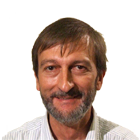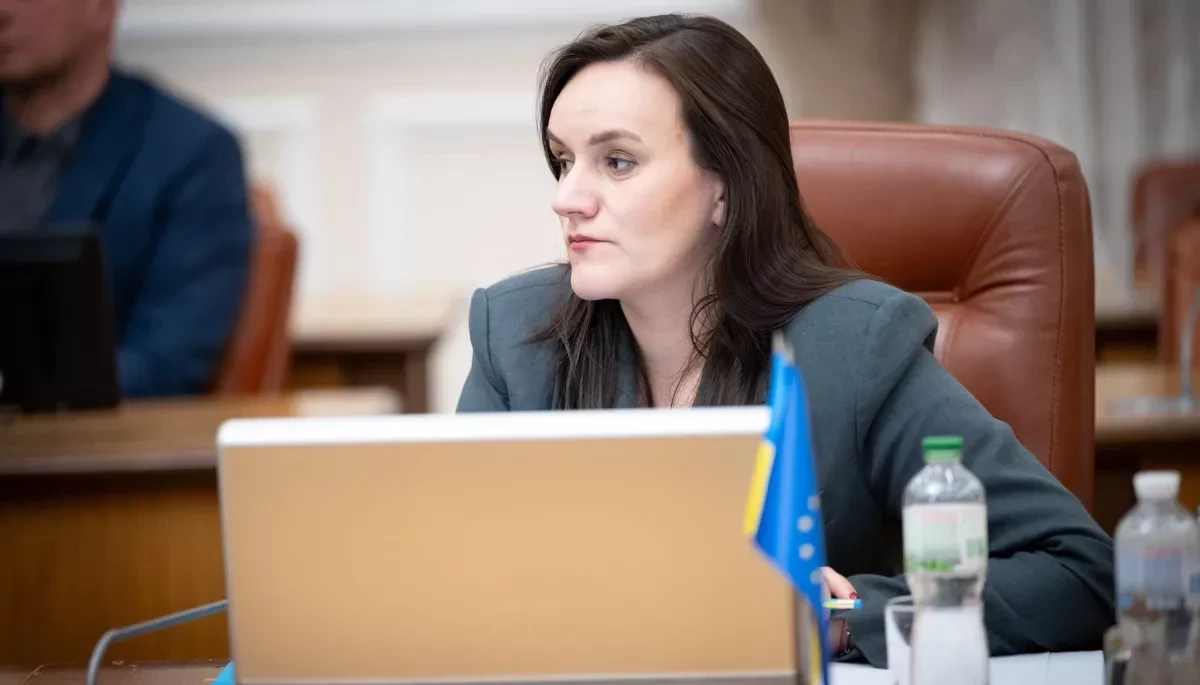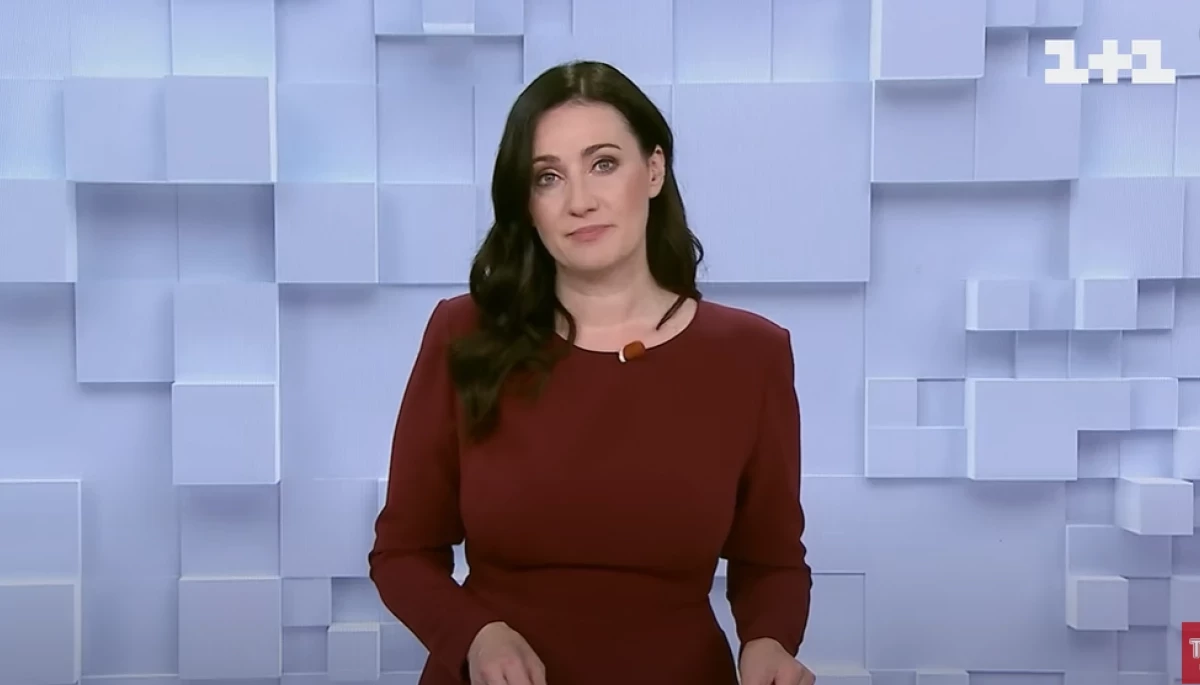
Summary of the "Yedyni Novyni" telethon monitoring for October-December 2022 Part #1
Summary of the "Yedyni Novyni" telethon monitoring for October-December 2022 Part #1
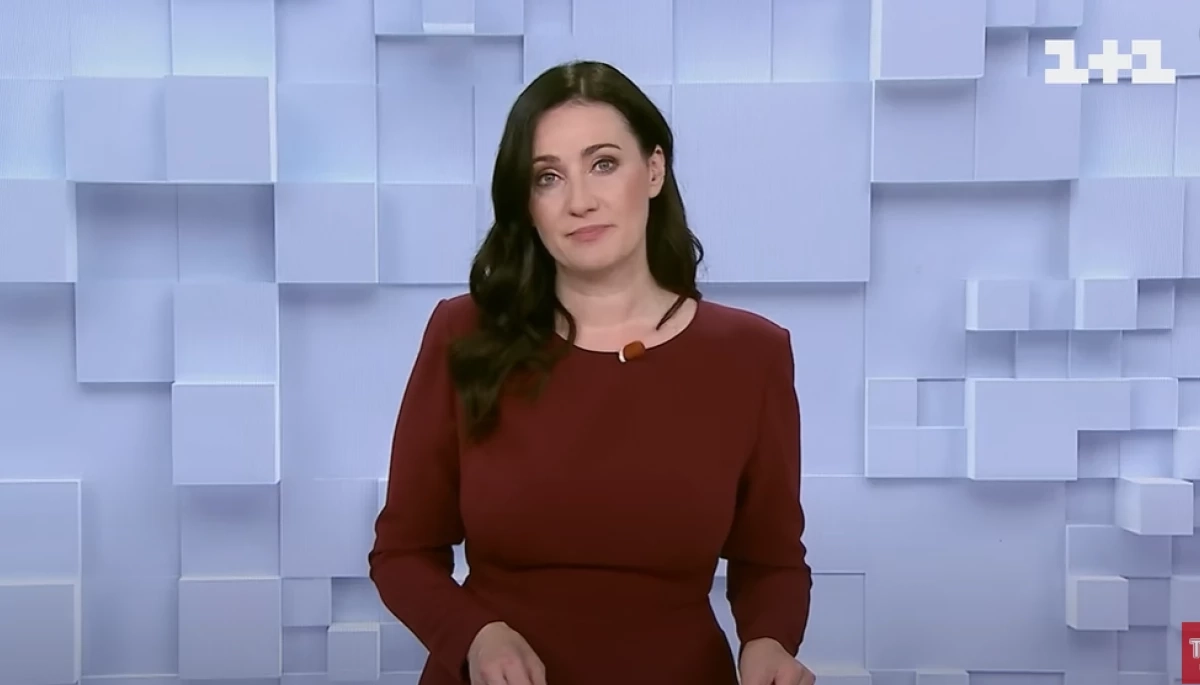

Same as before, this analysis will start with one crucial caveat. This monitoring may seem inferior as it is selective. Every week, I analyse only one day [of the week], and another six days remain "behind the scenes". But purely mathematically, even such intermittent, "discrete" monitoring over long periods (in this review — over three months) shows trends. Moreover, minimal calculations, displayed further in the tables, make these trends visible. Needless to say, there will be examples of the most vivid trends from the telethon itself.
Broadcast programming of the telethon
The overall broadcast programming during the last three months of 2022 remained unchanged. Daily broadcasts were divided into six-hour blocks, which initially were filled by five channels/media groups; at the beginning of November, the channel "We — Ukraine" (Ми — Україна) was added, which was created by employees of the former media holding "Ukraine".
Until now, the channels worked on the air alternately according to a fixed schedule. In my opinion, the only illogical point in the channels’ work schedule was that the one who broadcasts the marathon from 6 pm to midnight continued to work at night until six in the morning. This led to most marathon participants filling the night broadcast with reruns, not only from the previous day but even with the recorded broadcast parts from several days ago. With the appearance of the "We — Ukraine" team in the marathon, the anonymous "marathon generals" first gave this channel precisely these night slots (0:00—6:00). But later, the channel got into the general rotation, and endless night reruns returned to the marathon schedule again, because likewise, the channels started working from 6 pm to 6 am the next day. In my opinion, this is a categorically wrong decision because most channels/groups have long since shown their inability to qualitatively fill the airtime after 6 pm.
Another plague of marathon planning is that all channels work on different programming schedules. In the "single" marathon, which performs the function of the main information channel of the country, there is no single reliable news programming schedule available to the viewer. This is also categorically wrong because the part of the audience that is not interested in guest commentaries but rather in the news never precisely knows when the news block will appear.
Generally, there is one more odd thing. After the number of marathon participants increased to six players again, the work schedule of the channels lost dependability. Now it is chaotic, or at least I couldn’t figure out a clear system in these last months. However, from the viewer's perspective, this is a lesser evil than the neglect of night broadcasts and chaos with the different channels’ programming.
As in previous months, the closest to the logic of an information channel was the broadcast programming of Inter and Rada channels. In both of those, the one-hour blocks began with a short newscast and continued with brief guest commentaries. Yet there were exceptions.
On the Inter TV channel, in the night-time slot, there was only one "live" short news broadcast at midnight and then continuous reruns until 6 am. In the instances when Inter worked from 6 pm and broadcasted a final one-hour newscast at 8 pm, the next one-hour block didn’t feature any news.
Similarly, after the Rada channel's final newscast at 8 pm, the next hour was also news-free. On the other hand, Rada featured short hourly news programmes throughout the night-time blocks, but these, in fact, were more of an imitation, as they consisted of continuous reruns, sometimes from the previous day. Formerly, the channel featured short reports of the latest news that guest commentary presenters occasionally read (and somewhat chaotically) in alarming voices accompanied by music. In those "news broadcasts", they either read various voicers, which had already appeared more than once in formal news releases or (and even more often) filled them with excerpts from video addresses by the president, obvious PR statements about the activity of the President's Office, or retellings of officials’ posts on Twitter and Telegram. However, at some point, the channel abandoned this practice. I hope that this is a permanent change.
The information channel ICTV and STB channels’ joint editorial office’s broadcast programming was also logical. In this case, invariably from the very beginning of the telethon, the air was divided into half-hour blocks, each consisting of a 15-minute newscast and a 15-minute guest commentary (alternatively, a feature from the weekly "Facts of the Week" programme). Again, the exception is the work of the media group in the 18:00 to 24:00 slot. After the big final newscast at 8 pm, the next hour passes without newscasts, which is logical. Like most marathon participants, the media group's late-night broadcast only begins with a short newscast, followed by continuous reruns and guest commentaries from the previous day or even earlier. Half-hourly news is acceptable, but since the media group does not have enough resources for such a tight newscasting schedule, there are a lot of reruns of the same short forms and stories.
On the rest of the channels, the broadcast programming differs from the traditional programming of the typical information channel.
On Suspilne, the programming was as follows: 30-minute newscast, 2.5-hour guest commentary, another 30-minute newscast, and another 2.5-hour guest commentary. The programming was even worse (from an efficiency standpoint) on the days when Suspilne took over the final broadcast at 8 pm. In these cases, the channel featured guest commentary from 9 pm until midnight and no news broadcasts. When Suspilne was forced to work in the late-night block, there was a 30-minute news broadcast at midnight, followed by continuous reruns. The programming in the 6:00 to 12:00 slot, which I once came across, was strange: during the first three hours of airtime, there were short newscasts, but from 9:15 to 12:00 am, there were no newscasts (despite being a very busy time of the day). I did not understand the logic behind it – as well as why Suspilne abandoned the regular information programming of the first months of the marathon.
The We — Ukraine TV channel's broadcast programming schedule has been changed several times. At first, when the channel had access only to the late-night blocks, the programming was as follows: a 30-minute newscast, then an hour and a half of studio talk, a 20-minute newscast and an hour and 40 minutes of studio talk, and another 20-minute newscast, and an hour and 40 minutes of studio talk. Once the channel had full access to the marathon broadcasting, We – Ukraine adopted the programming schedule of the public broadcaster Suspilne – half an hour of newscasting and two hours of guest commentary. On 24 December 2022, the channel once again copied the odd programming of Suspilne, which meant the broadcast would begin with news from 6 to 9 am, followed by continuous guest commentary from 9:30 to 12 am. This does not correspond to an information channel’s functions.
The 1+1 TV channel, as in the previous months, did not have a stable programming schedule. In the last three months, I have identified at least four variations. All of them are somewhat illogical considering the function of the information channel. What could the logic of airing one-hour news reports first, interspersed with an hour-long guest commentary, and then switching to the same formula but with half-hour segments? Moreover, only partially logical was the case of 8 November 2022, when an hour-long 9 am newscast consisted of continuous reruns of everything that filled the 15-minute and 30-minute broadcasts in the previous air hours. The channel’s night-time broadcasts were also filled with reruns.
There is another warning concerning reruns of the news broadcasts and guest commentary at night. For some reason, most channels, including Suspilne, do not label them as reruns. This leads to complete absurdity because, at 3 am, the presenter greets the audience with a "Good evening!" However, much worse is the fact that all time markers in the recording become automatically false, since when the host at night says "today", it really means "yesterday"; and when they say "this morning", the viewer does not understand at all what to think: what specific morning is talked about? At last, it is still possible to justify reruns of guest commentary (of course, when the topics of conversation are not tied to specific events of a particular day) or documentaries. But news reruns are nonsense. News is a live and unique phenomenon.
The most critical issue with such programming is an unequivocal loss of efficiency at certain moments. It is generally vital for the night-time blocks. Because unlike the work of the marathoners' "information front", the war does not stop at night: various, including large-scale, events occur. The enemy often carries out massive enemy attacks by drones or missiles at night. Therefore, if the audience, on such a night, needs to quickly get at least some information about the strikes and their consequences in the telethon (presenters of which promise to "promptly inform about the events of the war"), they definitely cannot find out anything since they are being "fed" yesterday's news.
Large (2.5 hours) guest commentaries on separate channels are also critically important for the review because, according to my observations, often in guest commentaries, when everything goes "according to the formerly approved plan", the news function is "off". This, of course, is a matter of the editorial board’s internal organisation, where news and guest studios often have separate lives with neither mutual coordination nor a rapid exchange of information between them (as on the Rada TV channel, for example) or it being critically minimal.
In addition to news and guest studios, some other elements appear regularly or occasionally in the broadcasts of various channels. All channels show the traditional evening video addresses of President Volodymyr Zelenskyy, and all channels show documentaries from the "Heroes" series (both of their products and those of other telethon colleagues). In addition, the 1+1 channel's broadcast offers documentaries from the "We will rebuild!" (Відбудуємо!), "Invincible" (Непереможні), and "Berehynya at war" (Берегиня на війні) series. On Inter, it is the series of documentaries "Ukraine for which we are fighting" (Україна, за яку ми боремося), "One day" (Один день), and "Europe after the war" (Європа після війни). On ICTV and STB channels — documentaries from the series "If it weren’t Ukrainians" (Якби не українці). Most of these films are really interesting and well-made (in my opinion, but I am not an expert on documentaries, of course). ICTV and STB are also broadcasting two mysterious anonymous projects, "Antizombies" (Антизомби) and "Civil defence" (Гражданская оборона).
Such products are a complete non-format for the marathon since they are produced in an enemy’s language and are subtly propagandist. These projects are clearly designed for a Russian audience that does not watch the marathon. Even in the blocks of different channels, broadcasts from various events appear sporadically. Sometimes this is justified in terms of information, such as the broadcast on the 1+1 channel on 30 September 2022 of an urgent briefing by NATO Secretary General Jens Stoltenberg when Russia announced the "annexation" of captured Ukrainian territories. Or the video message of the Minister of Energy Herman Halushchenko with a request for Ukrainians to reduce the load on the power grid (Inter’s broadcast block on 10 October 2022). Or the broadcasts of solemn Christmas masses in Kyiv and the Vatican, aired by ICTV and STB on 24 December 2022. Yet, forgive me, sometimes it is a waste of airtime. Such as, for example, broadcasts of daily briefings by the deputy head of the President's Office, Kyrylo Tymoshenko, about the situation in the regions (I saw them in the blocks of at least Inter, Rada, and We — Ukraine channels).
Mr. Tymoshenko is so indecently present in this telethon that his routine briefings are broadcast in full instead of briefly presenting important factual information from them in the news. Moreover, the broadcast of the panel discussion of the Ukrainian Women's Congress on ICTV/STB on 28 November 2022, or the broadcast of the speech of the Deputy Speaker of the Verkhovna Rada, Olena Kondratyuk, on the Crimean Platform on the Rada channel’s block on 24 October 2022 seemed like an unjustified waste of time.
Lastly, some pieces are broadcast at a fixed time, regardless of which channel is currently scheduled in the telethon. Such as, for example, Kateryna Osadcha's project "Find yours" (Знайти своїх) and the immortal "Bayraktar-News" (Байрактар-ньюз) from Kvartal 95, which are a clear non-format for a telethon. Not to mention it is also not funny at all.
Guest studios of the telethon
As before, most guests communicate with the presenters in video communication mode. In November-December, for apparent reasons, communication problems occurred more often than in the previous months, but in the end, they were not critical in most cases. The relative number of pre-recorded interviews was also about the same as before.
In total, during monitoring, I analysed 13 daily broadcasts. The activity of various telethon participants in the guest policy was as follows:
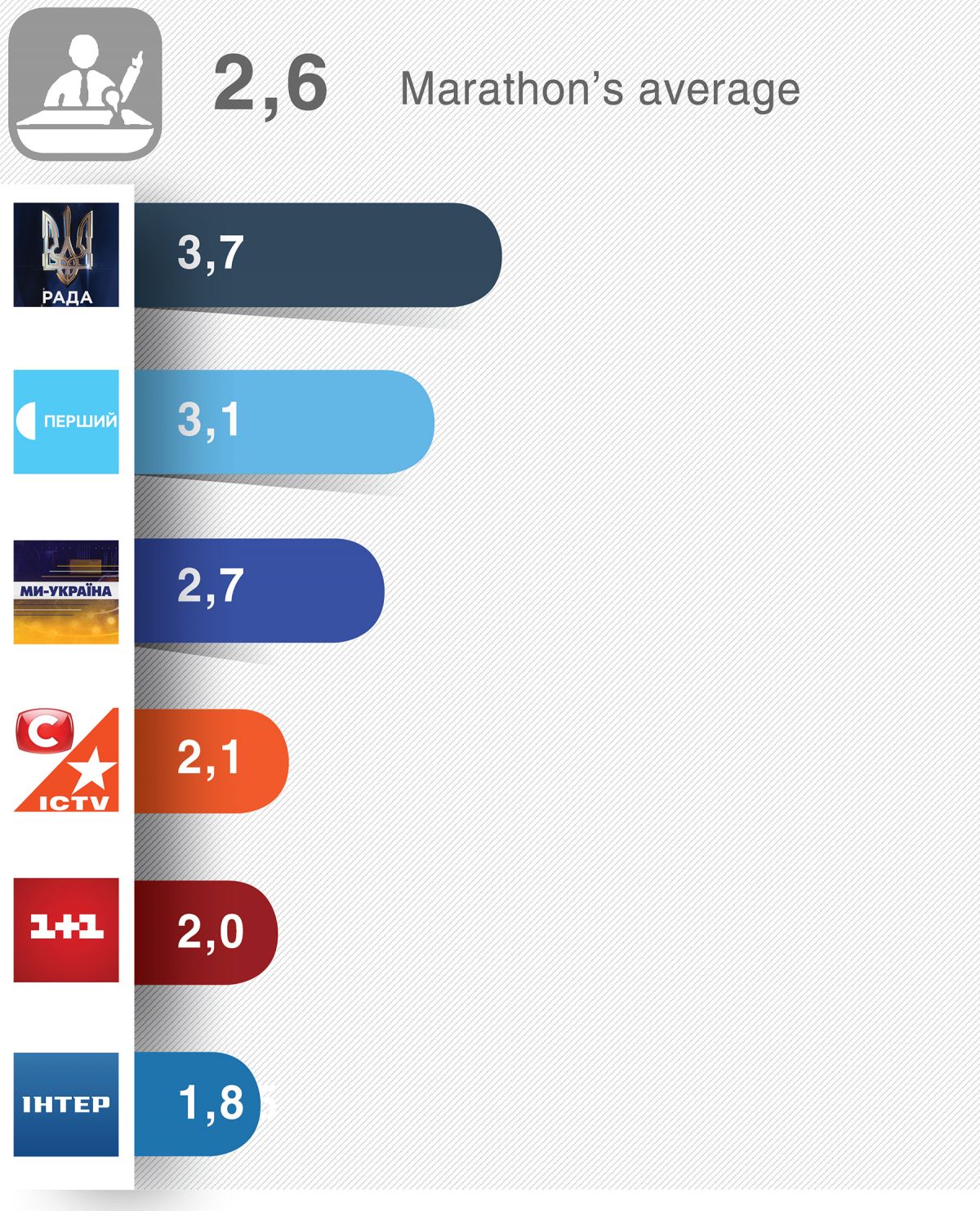
Rada channel was the one that invited the most guests. There were even almost five guests per hour of broadcast on some days. However, unfortunately, the large number of guests was often accompanied by a not very high quality of these interviews, in my opinion. In addition, this crazy guest schedule often led to the fact that even an informed guest with an interesting topic had to be interrupted by the channel's hosts, and sometimes even interrupted mid-sentence due to the lack of time. On the other hand, even a relatively large number of guests on the Suspline channel’s block did not affect the quality of the interviews. Here I would like to note the high-quality work of both live broadcast presenters, Hanna Cherednychenko and Andriy Dikhtyarenko, and Olena Removska and Ihor Shavra, who conducted the recorded interviews.
The number of guests on the TV channel We — Ukraine was close to the average for the telethon. The interviews by Olena Tsintila and Mykyta Mikhalyov were of the highest quality. The broadcasts of the other three channels of the marathon had significantly fewer guests. As in previous months, ICTV and STB channels explained this, firstly, by their large share of news (in fact, it being half of the entire broadcast), a significant number of stories from the weekly "Facts of the Week", and other films. At the same time, I believe that both Vadym Karpiak and Yana Brenzei also conducted high-quality guest commentaries on the channels’ air.
1+1 channel invited fewer guests but conducted more very detailed conversations with them. Among the channel's presenters, I would like to note the high-quality work of Yevhen Plinskyi. In the broadcasts of Inter TV channel, the number of guests was the smallest since the guest segments of the broadcast were largely filled with correspondents' stories. Talk studios were managed better by Oleksiy Fadeev and Oleksandr Prosyanik as their hosts.
In total, 801 guests participated in the telethon’s guest studios during the analysed broadcasts. This is what it looked like by categories (or social roles):
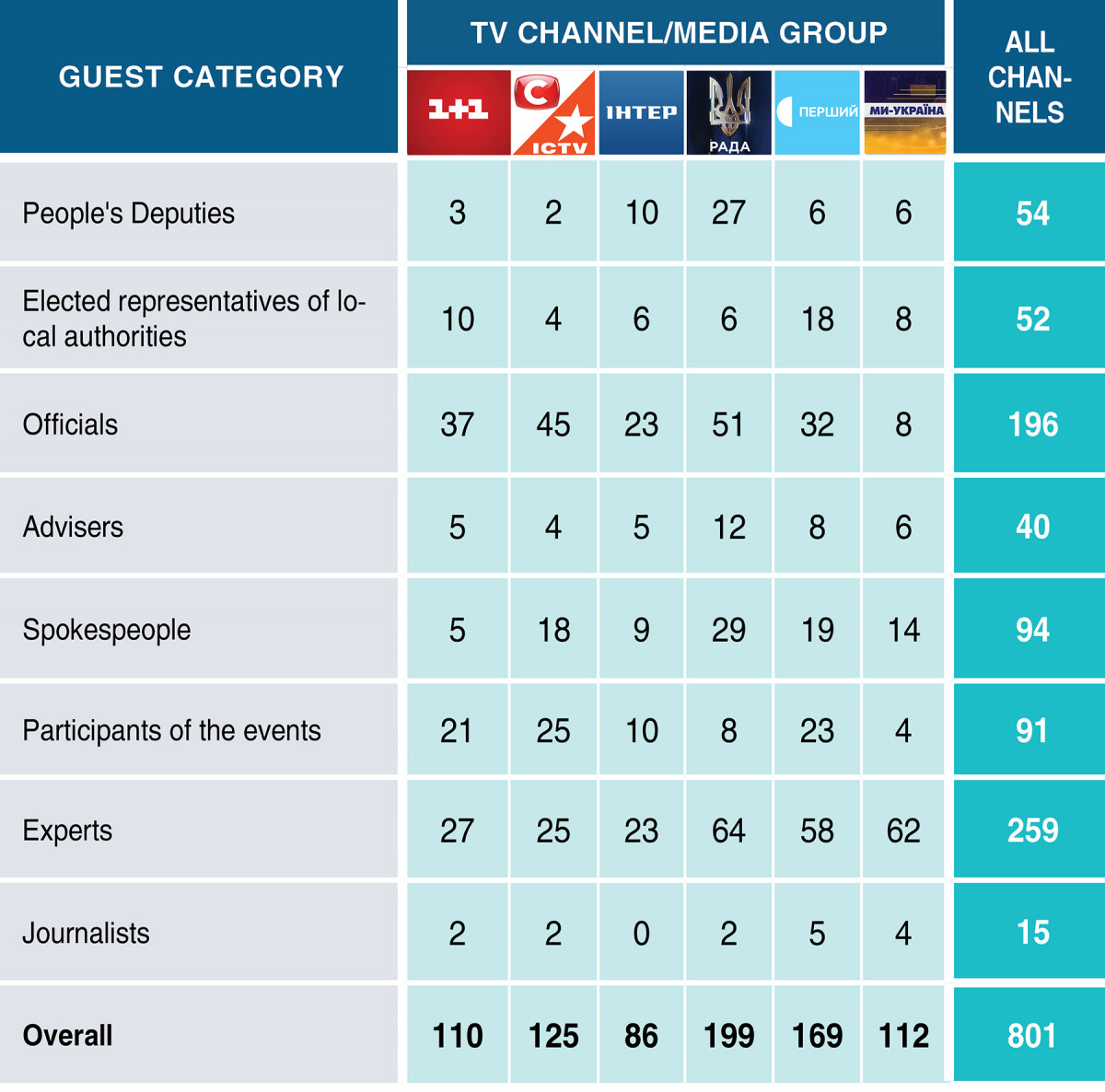
* Here and in the following tables, the abbreviation SLM means "ICTV and STB", and the abbreviation Ukr. means "We — Ukraine" channel.
This is how this distribution looks like percentage-wise:
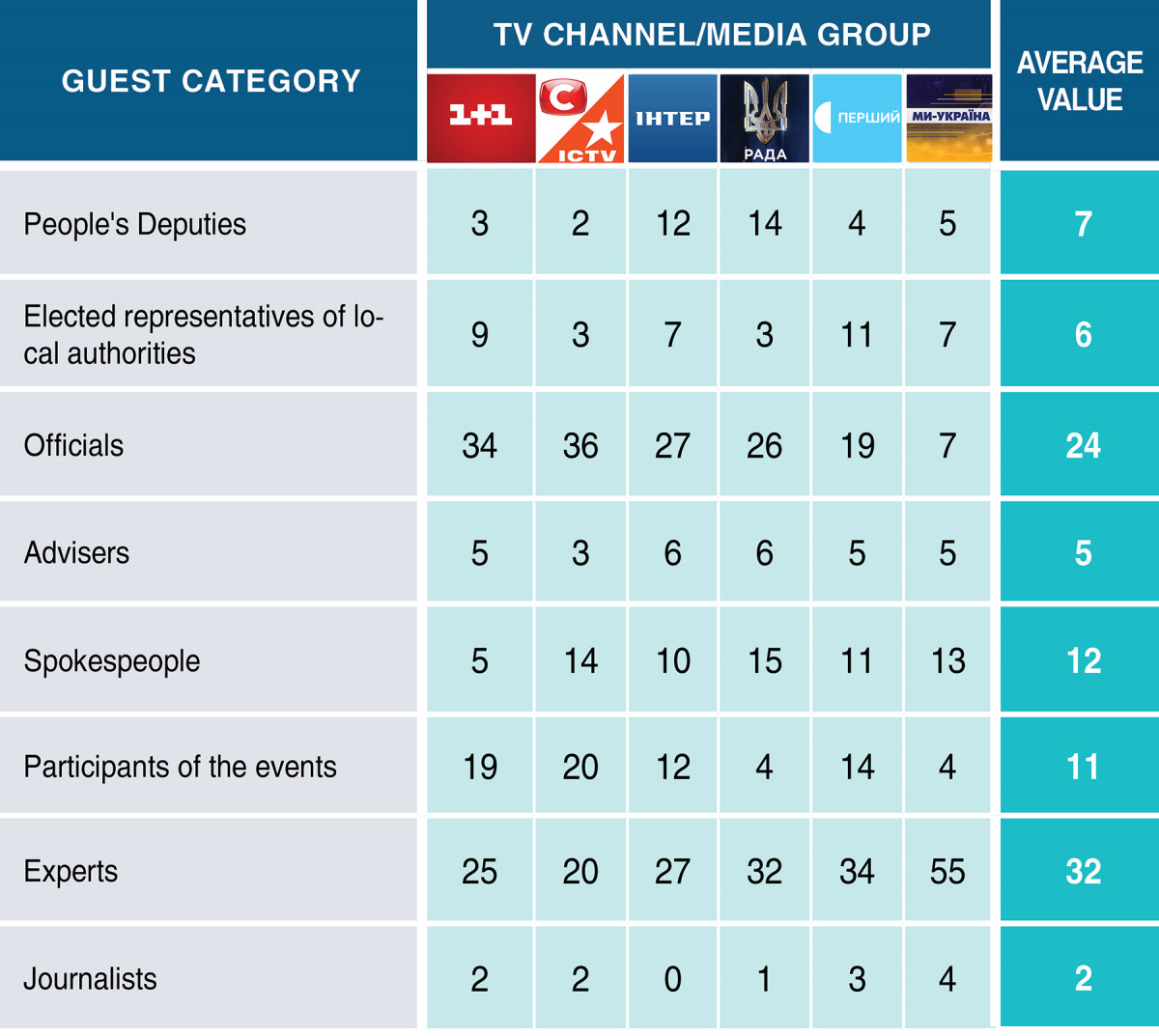
Additionally, here is one more comparison to the previous period (March-September 2022). This table also shows the percentage from the total number:
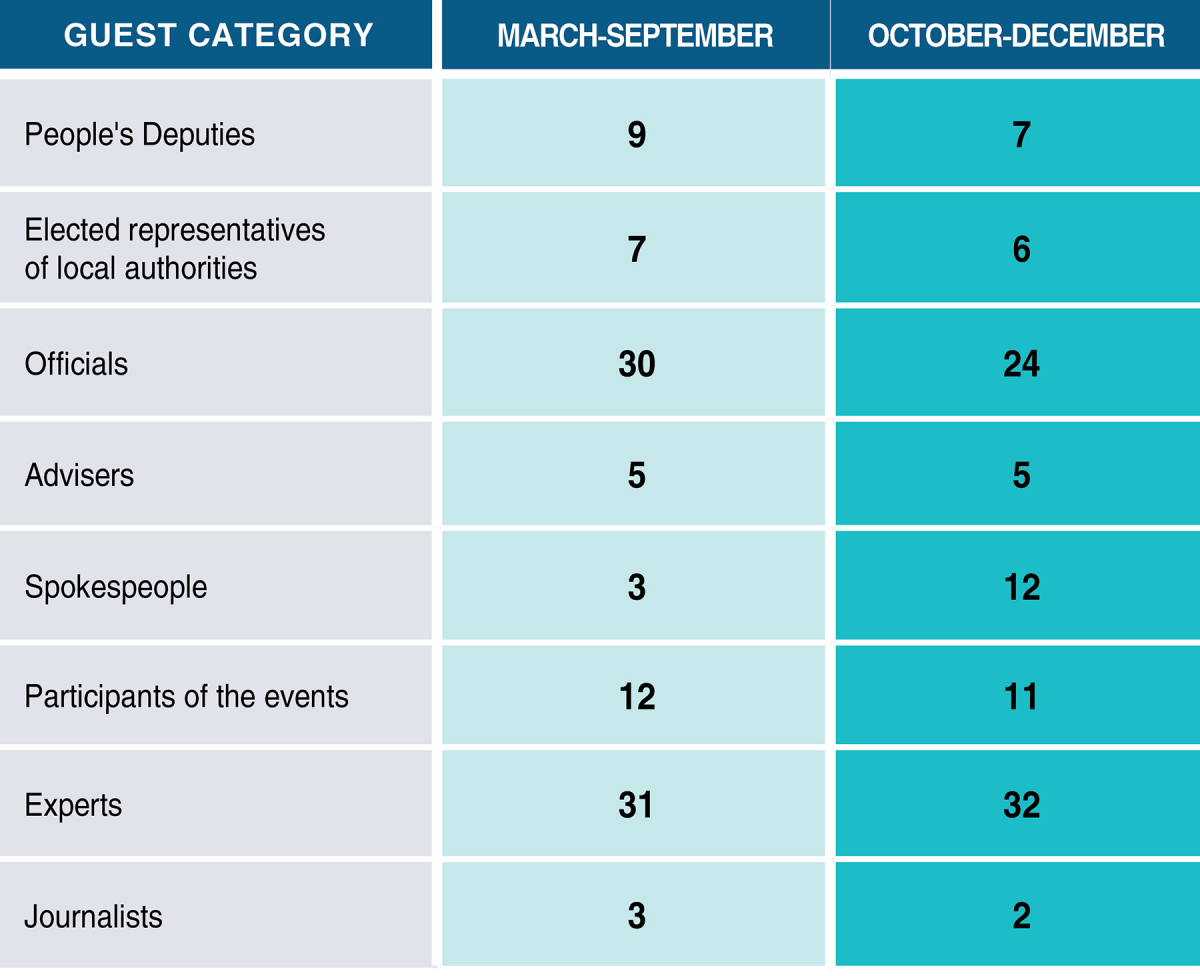
As one can see, there have been significant changes in the qualitative composition of the telethon guests. First, the number of aired people's deputies and government-elected representatives decreased slightly. Secondly, the number of officials of various levels has also significantly reduced. On the other hand, the number of spokespeople has increased considerably. The presence of guests in the remaining categories remained unchanged. Based on this observation, we can conclude that the share of newsmakers (that is, people who make decisions and, therefore, are the primary sources of news) has decreased at the expense of people who only communicate information, and sometimes the position of these newsmakers. From the point of view of the audience's access to primary sources, this is a certain, although not yet critical, deterioration of the content quality.
By categories, the picture is as follows. Rada (14% of all guests) and Inter (12%) TV channels appealed to people's deputies the most in the last three months. All other channels have sharply reduced communication with this category of guests, except for Suspilne, which remained at a stable level — 4% of all guests. Instead, Rada, as before, actively communicates with elected representatives of local authorities of various levels on air. Likewise, 1+1 also pays sufficient attention to this category of newsmakers. I consider this a positive trend since this category of people is well-versed in the information "on the ground". Elected representatives of local authorities are rarely invited by Rada, ICTV, and STB channels (in both cases - only 3% of the total number of guests).
On the other hand, among all channels, ICTV and STB most frequently invited officials (36%). 1+1 did so almost the same (34%). We — Ukraine channel had the smallest share of newsmakers in guest commentaries
(7% of representatives of local authorities and officials and 5% of people's deputies). On the other hand, more than half of its guests (55%) were experts. It is not the best distribution for an information channel. When this team was still working under the banner of the "Ukraine" media group, their guest lineup was much more balanced, and newsmakers filled almost half of the guest studios' broadcasts.
The representation of political parties in the telethon’s guest studios, as in previous months, was uneven. In the fourth quarter of last year, the following factions and deputy groups’ people's deputies were on air:
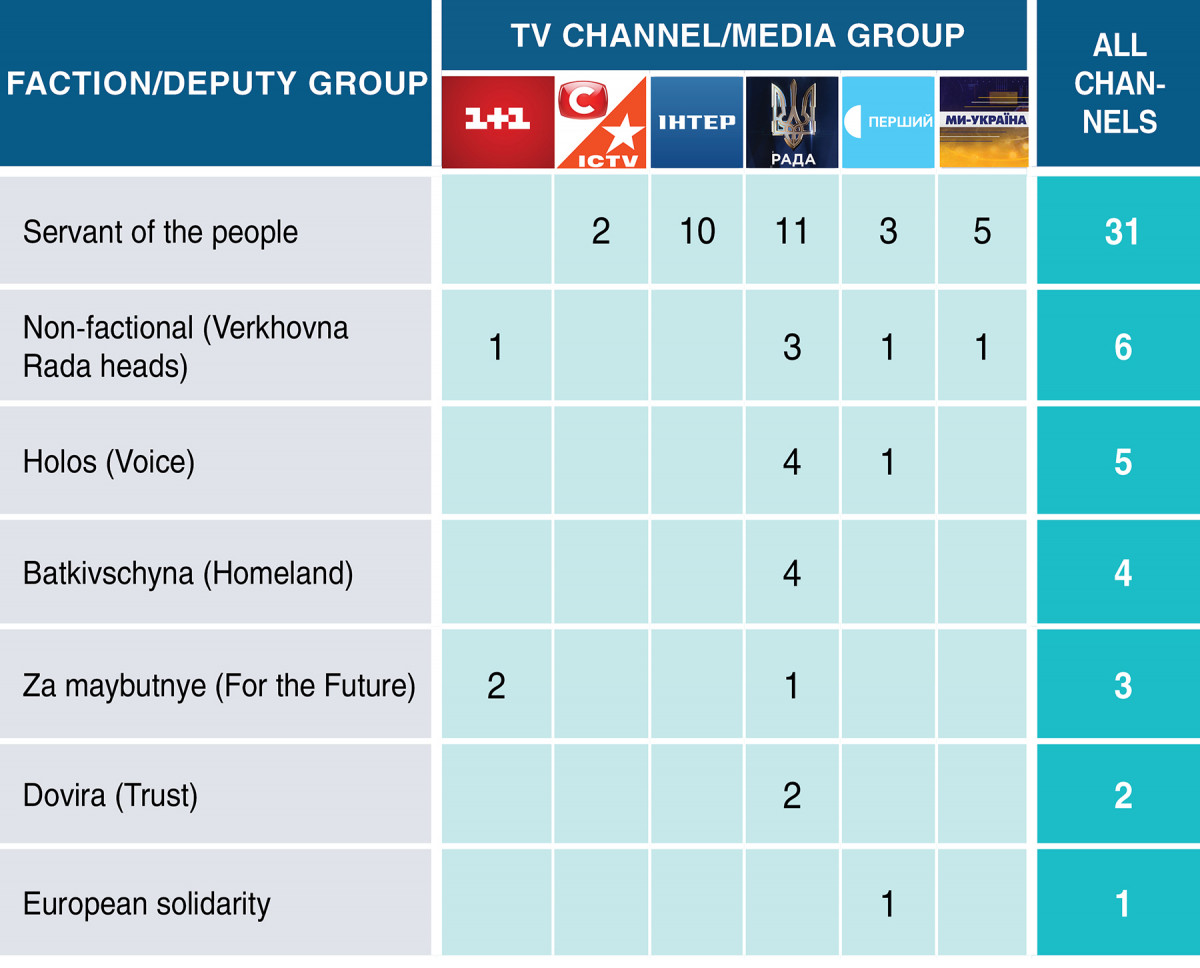
This is what it looks like percentage-wise:
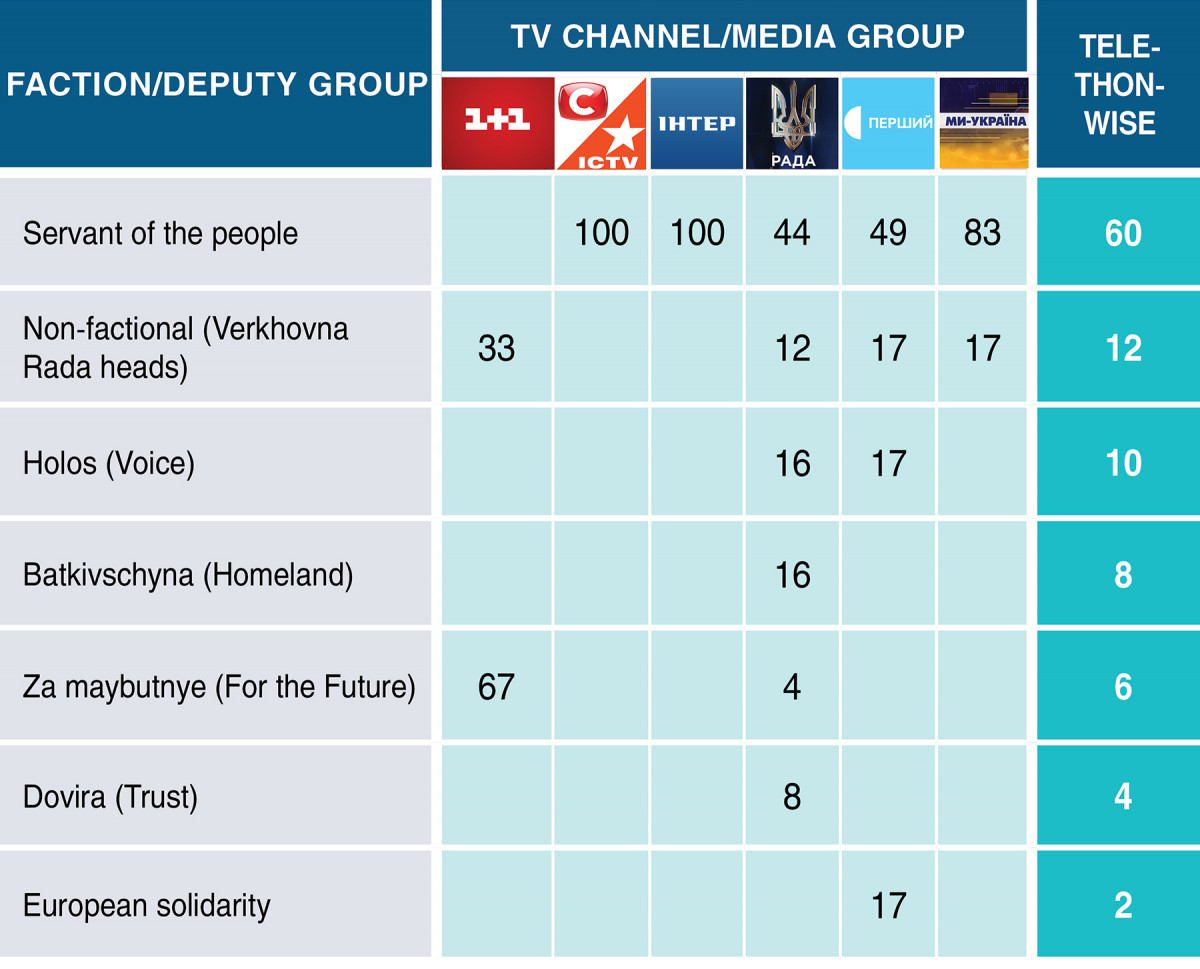
Compared to the previous period (as a percentage of all people's deputies on the air of the marathon):
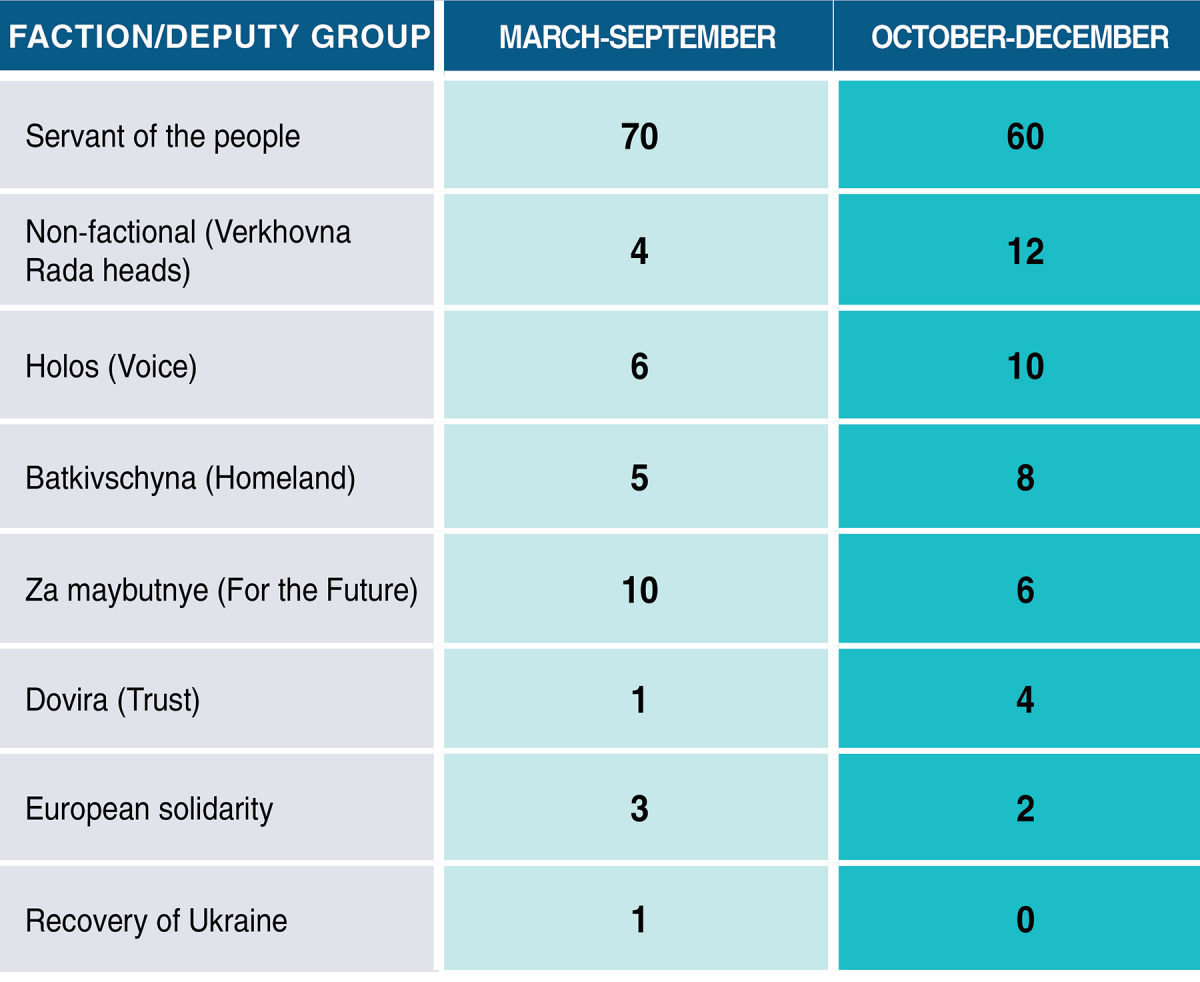
The single leader here is the party in power. It seems that its share in the telethon’s guest studios has decreased, but not much, because of the formally non-factional heads of the Verkhovna Rada, only Olena Kondratyuk is not a member of the "servants". The share of the deputy group Za maybutnye (For the Future) has decreased because, during these three months, they were not invited to the 1+1 broadcasts as often as it was in the first six months of the telethon (For the Future is a political project of 1+1 owner, Ihor Kolomoisky). Instead, this time the representative of this deputy group even appeared on the Rada TV channel. The representation of Holos and Batkivschyna on telethon’s air increased slightly. Meanwhile, European Solidarity’s people's deputies’ representation remains on the verge of statistical error, which can be explained exclusively through Suspilne’s efforts.
As I already mentioned, very few people's deputies were on the 1+1 channel’s air. Ruslan Stefanchuk, the parliament speaker, once appeared on the channel. However, the For the Future representatives have been present on air twice, in comparison. In the broadcasts of ICTV, STB, and Inter channels, all 100% of the guests-deputies were "servants" (of the people). An almost identical situation was in the broadcasts of We — Ukraine, and only once did a representative of another political force (Batkivshchyna’s member), Vice-Speaker Olena Kondratyuk, appear here. The Servant of the people party comprised half of the guests in the guest studios on Suspline. Holos and European solidarity factions were also represented, and the vice-speaker, Olena Kondratyuk, also appeared as a guest once.
The guest policy of the Rada TV channel has undergone the most significant changes. During the last three months of the year, the party in power was significantly less represented on the channel (41% of guests compared to 71% in the first six months of the telethon). In fact, in all components (including guest ones), the channel paid more attention to the representatives of the President's Office than to pro-government deputies. On the channel's broadcasts, the representation of Batkivshchyna was traditionally significant, mainly by its leader, Yulia Tymoshenko. In the meantime, the channel began inviting Holos representatives to the channel’s blocks (which did not happen in the first half of the year). The channel also found a spot in the schedule for parliamentary groups. The absence of European Solidarity representatives in Rada’s blocs remained unchanged.
Concerning the personal presentation of people's deputies, the picture for the last three months of the previous year was as follows:

Herein the picture has changed compared to the telethon’s first half a year. There were no clear leaders among the deputies. Andriy Herus justifiably topped this list, as he is the head of the Verkhovna Rada Committee on Energy. Obviously, there were a lot of questions about energy in the last months of the year. Danylo Hetmantsev's four appearances on air were explained by urgent questions about his competence as the head of the Verkhovna Rada Committee on Finance, Tax, and Customs Policy. In particular, correspondents talked with him about macro-financial assistance from partners to Ukraine, cooperation with the International Monetary Fund, and the state budget for 2023.
People's deputy Yevhenia Kravchuk was invited to the broadcasts as a member of the Ukrainian delegations to the PACE and the OSCE Parliamentary Assembly or as a member of the Ukrainian delegation to the Crimean Platform parliamentary summit in Zagreb to comment on specific issues within her competence. Suspilne invited vice-speaker Olena Kondratyuk to talk about the Crimean Platform parliamentary summit; for the We — Ukraine TV channel, she talked about the Ukrainian Women's Forum and on Rada’s - about her work trip to Belgium (the last one, in my opinion, was not very justified). However, I qualify all three appearances of Yulia Tymoshenko on Rada’s broadcasts as a form of personal PR, since during these, with the complete indulgence of the presenters, she acted as an "expert on all issues in the world" and necessarily had "revolutionary" proposals on all topics.
The only general trend that remains unchanged is the approach when representatives of various parliamentary committees are almost always chosen from among the representatives of the Servant of the people. But during this period, I did not encounter situations where it would be critical to maintain a balance of opinions because conflicting internal political topics were not discussed in guest studios in principle. This approach could sometimes affect the quality of highlighting specific topics because it is not always the representative of the "Servant of the people" who is the most competent member of a particular parliamentary committee.
The complete list of telethon guests who were on the air during the days I analysed is again extensive, so I will only list those people who were on the marathon’s air 5 times or more during this period:

This time everything looks quite logical. The first places in this list were taken by people who, by profession and position, have access to accurate information. Spokespeople Yuriy Ihnat, Nataliya Humenyuk, Serhiy Cherevatyy and Serhiy Bratchuk were marathon guests more than ten times. Melitopol’s Mayor, Ivan Fedorov, joined them in the top five of the list. These people could competently talk about the situation in the hottest three months in the south and east of Ukraine.
Other spokespeople and representatives of the press services of various structures were invited a little less often: Oleksandr Khorunzhyy (State Emergency Service), Andriy Yusov (Main Directorate of Intelligence), Oleksandr Shevchenko (Ukrzaliznytsia) and Tetyana Sapyan (State Bureau of Investigation).
The channels actively invited newsmakers-heads of regional military administrations: Oleh Synehubov of Kharkiv, Vitaliy Kim of Mykolaiv, Oleksiy Kuleba of Kyiv, and Serhiy Hayday of Luhansk. However, it is surprising that during these months, the head of the Donetsk OVA, Pavlo Kyrylenko, was not invited on air. Events in cities and regions were also often discussed with elected representatives of the authorities: First Deputy Chairman of the Kherson Regional Council, Yuriy Sobolevskyy, and Mayor of Kharkiv, Ihor Terekhov (who, by the way, has finally switched to the Ukrainian language in these past months, bravo!). The events in the occupied Mariupol were discussed with the mayor's adviser, Petro Andryushchenko.
President's Office representatives, deputy head Kyrylo Tymoshenko and advisors Mykhailo Podolyak and Oleh Ustenko were frequent guests of the broadcast. Among other officials in this category, popular guests were the Secretary of the National Security and Defense Council, Oleksiy Danilov, and the Minister of Culture and Information Policy, Oleksandr Tkachenko.
Among the deputies' representatives category, only Andriy Herus made it to the top of the list this time. He was justifiably invited on air to discuss the enemy's destruction of the energy infrastructure and its rescue by energy workers precisely as the head of a specialised parliamentary committee.
All the others at the top of this list were experts; even Vadym Denysenko participated rather as an expert (as the director of the Ukrainian Institute for the Future), although sometimes the presenters continued to present him as an adviser to the Minister of Internal Affairs. Among the "classic" experts of the telethon in November-December were: political pundit Volodymyr Fesenko, military experts Petro Chernyk and Serhiy Grabskyy, and international affairs experts Bohdan Ferens and Dmytro Tuzhanskyy, who most often commented on various topics. Moreover, in terms of the experts’ category, the only remark is that presenters on all channels have rarely explained their competence to viewers, limiting themselves to short definitions of "political scientist", "military expert", or "expert in international politics". Oleksandr Kharchenko, director of the Energy Research Center, became the "new face" of the upper part of the telethon guest list for obvious reasons.
During this period (November-December), the composition of the telethon’s guests was much more balanced (specifically in terms of competencies) and closer to the informational picture of each day than it was in the first six months of the telethon's operation. The tendency for journalists to use various advisors or experts as informants on different topics has also decreased, although it has not entirely disappeared. During the fourth quarter of last year, Oleh Ustenko, the adviser to the president on economic issues, remained the telethon's regular speaker. While he is undoubtedly a competent person, I will emphasise again: the adviser cannot perform the "pure" function of an expert when evaluating the work of the structure for which he works (in this case, the president and the economic power bloc). Indeed, I also have doubts about using adviser Mykhailo Podoliak's background as an "expert on all issues in the world" in the telethon. His actual competence remains a mystery to me.
Here is the short recap and composition of the most discussed topics in the guest studios. The distribution looked like this:
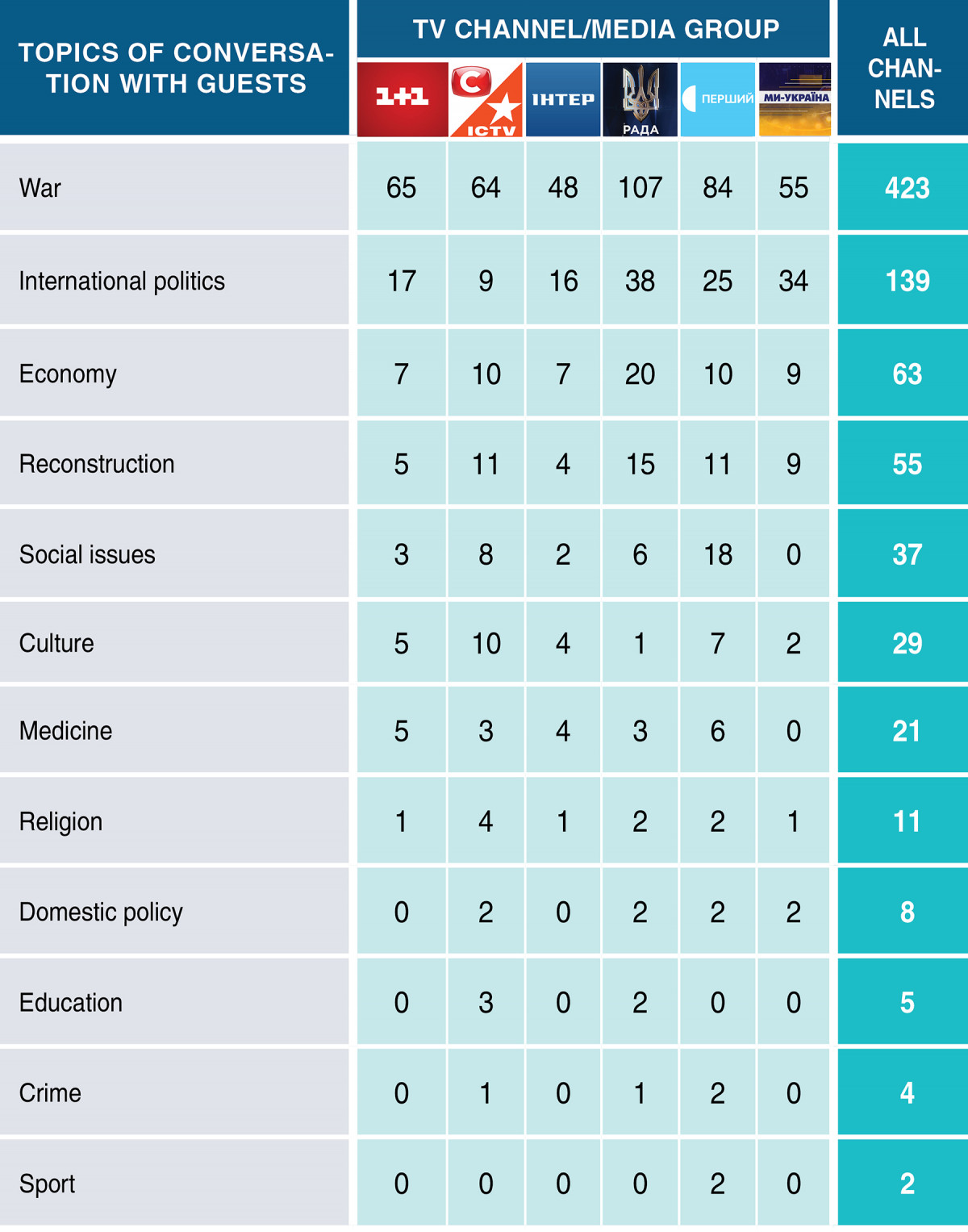
All guest studios percentage-wise:
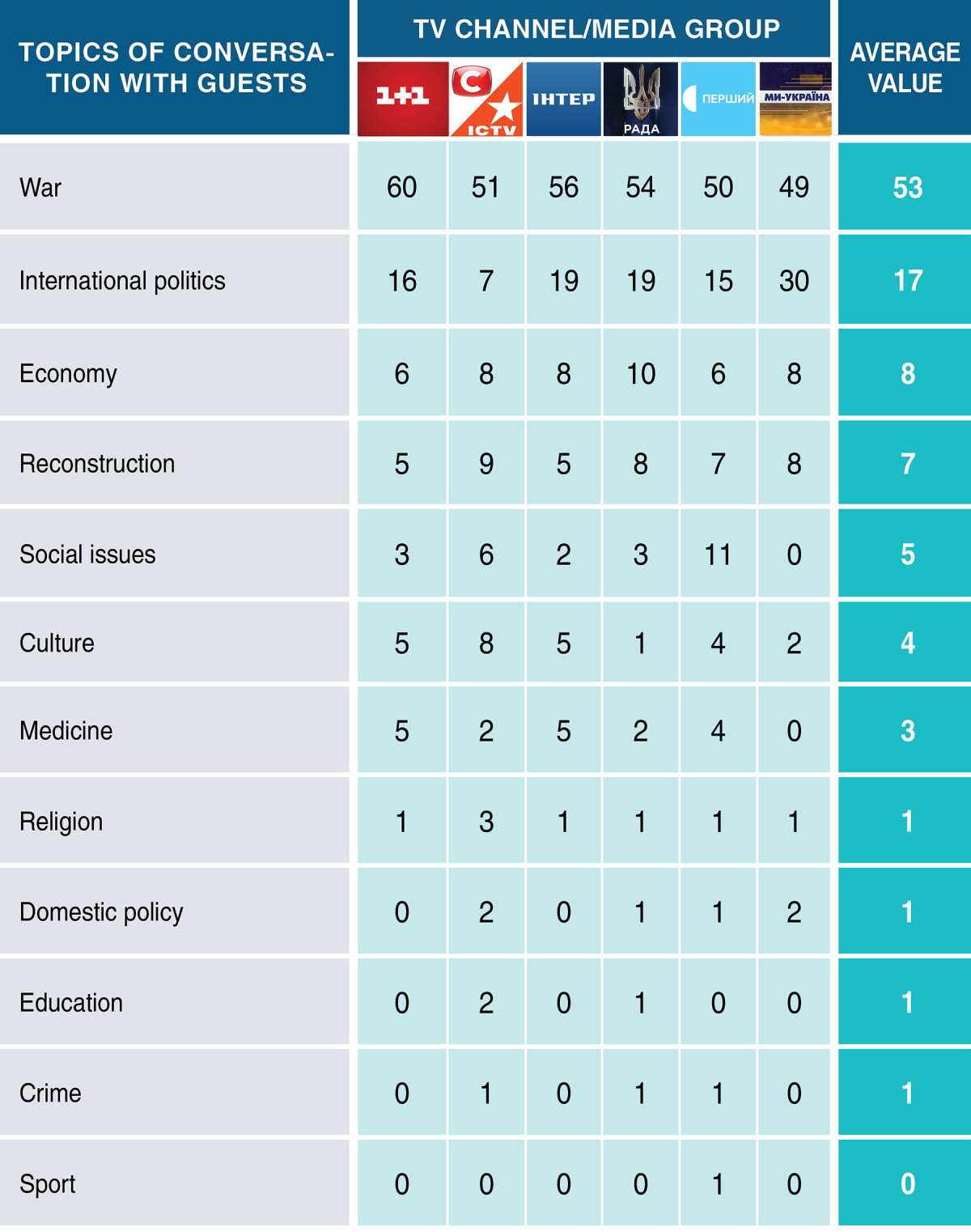
The topic of war continues to dominate, which is quite logical since everything is related to war and is the main topic of the telethon by definition. The 1+1 channel (60% of all guests) paid the most attention to purely military issues in the guest studios, and the We — Ukraine channel (49% of all guests) paid the least attention. But at large, in this regard, all channels followed the general trend.
The second place holds the topic of international events and politics, which is generally explained by a large number of events and newsbreaks related to Western military-technical and humanitarian aid, Western sanctions against Russia, the work of Western and Ukrainian diplomacy, and vice versa with Russia's search for allies, arms supply to Russia by Iran, China's difficult position regarding the Russian-Ukrainian war, etc.
The editors should be given credit for this: in this whole array of international topics, there was nothing frankly superfluous; all topics, in one way or another, related to Ukraine in the international context. Much less attention was paid to international topics in the broadcast blocks of ICTV and STB than in other channels (only 7% of guest studios), but, in my opinion, too much attention was paid to this topic in the guest studios of the We — Ukraine channel (30%, which, by the way, was the same in the first six months of the telethon, when the same team of journalists still worked within the media holding "Ukraine"). In the guest studios of other channels, the share was close to the average value for the telethon.
All channels/media groups paid roughly equal attention to economic issues and topics related to reconstructing what was destroyed and damaged by the enemy. The situation with social issues was very uneven. Suspilne channel (11% of all topics) and, to some extent, ICTV and STB channels (6%) paid the most attention to it. Other channels paid little attention to social topics, while the We — Ukraine channel did not discuss these topics in the studios at all.
ICTV and STB channels (8%) paid the most attention to cultural topics, but little was said about it in the guest studios of the We — Ukraine (2%) and Rada (1%) channels.
Now we will compare the topics of the guest studios with the first half-year of the telethon:
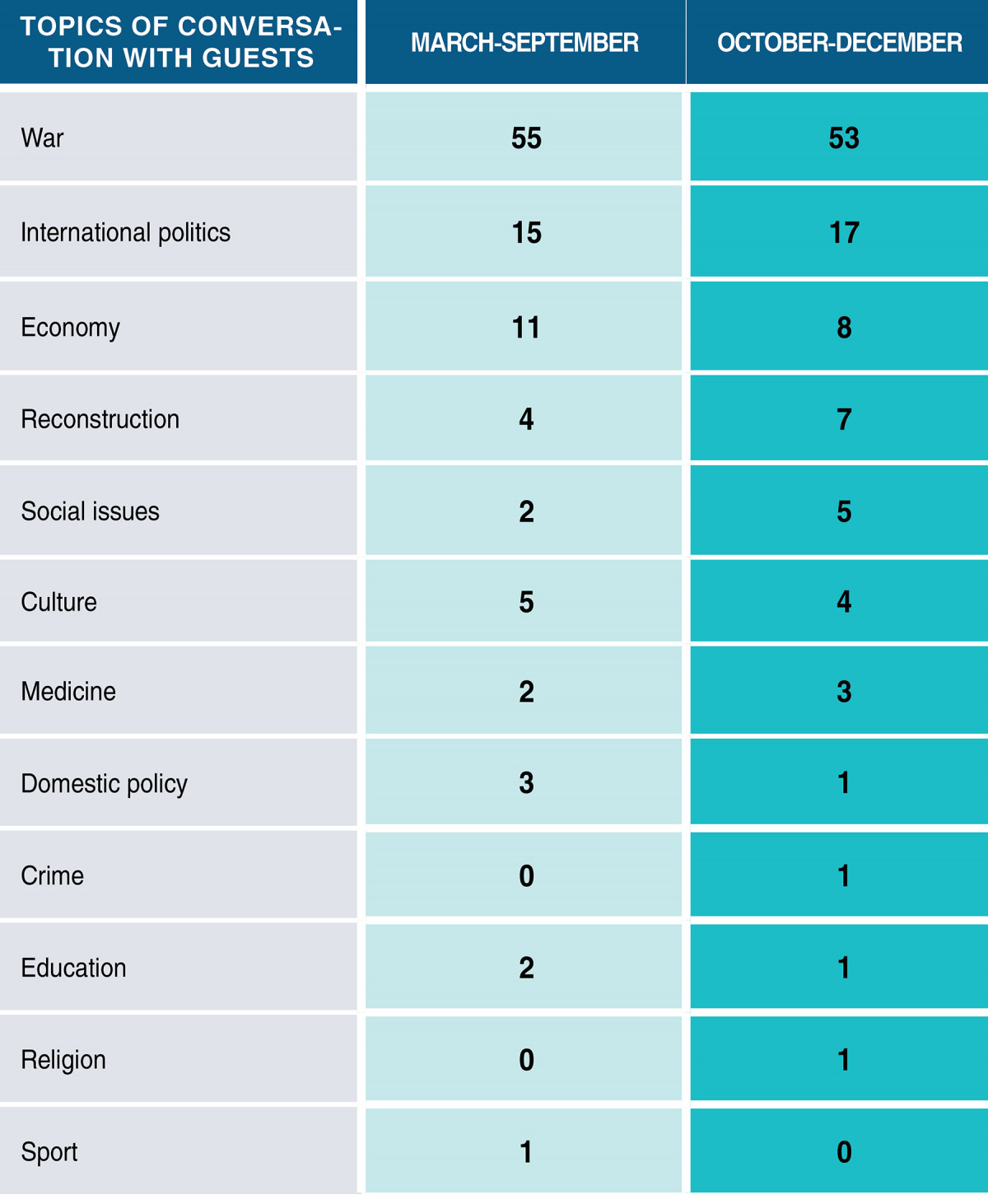
This table shows that the shares of topics related to war and international politics have not undergone significant changes. In the fourth quarter of last year, there were fewer economic topics but a little more discussion of the issues related to reconstruction (although these two thematic clusters are mainly interconnected). The share of social topics increased by 3%. Instead, the topics of domestic politics, which were already dimly represented in the marathon in the first half a year of its work, were completely marginalised in October and December. Other changes were minor, within one percentage point, which is not indicative. The appearance of religious topics in guest studios in the last months of the year was explained by two current topics: the beginning of investigative actions against the Moscow Patriarchate in Ukraine and the issue of the church holidays calendar reform, which became highly relevant before the celebration of Christmas on 25 December 2022.
To be continued.


